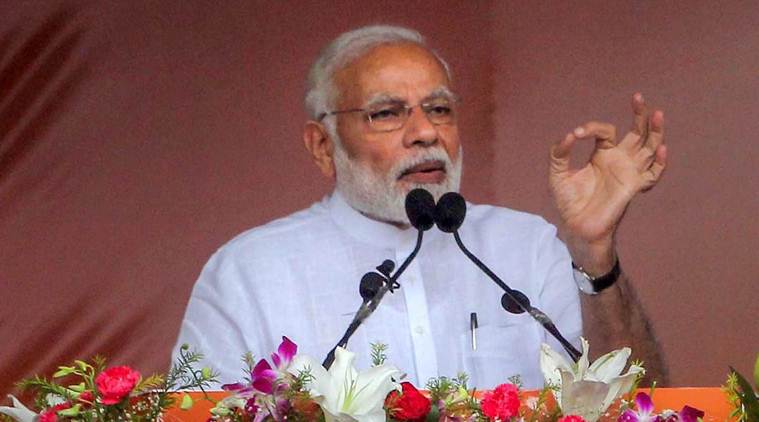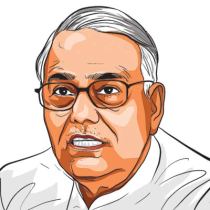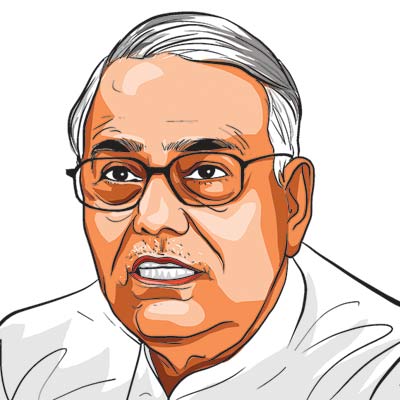Truth and spin
Facts do not back government's assertion about economic recovery

PM Modi said, “…that the Congress had set the country’s economy on a landmine.” (PTI Photo/File)
While inaugurating the Indian Post Payments Bank on September 1, the prime minister attacked the Congress after awarding a gold medal to himself for the economy recording a growth rate of 8.2 per cent in the first quarter of the current fiscal. Speaking about bank NPAs, he said that 12 big defaulters were given loans before 2014 and that the NPAs of these defaulters were to the tune of Rs 2 lakh crore. “Similarly, there were 27 massive loan accounts which have NPAs of Rs 1 lakh crore… Despite knowing that loan recovery would be difficult, special people were awarded loans at the behest of the ‘family’. Not just this, when such people defaulted pressure was created on banks to release more loans for them. This fraud was done in the name of restructuring. A phone call by the Namdaar family had replaced rules and regulation… When we formed the government in 2014, the truth about the fraud got revealed… we got to know that the Congress had set the country’s economy on a landmine. If we had told about this to the country or the world, that landmine would have gone off… We have extricated the country out of the situation very carefully,” he said.
This statement raises many questions. Did the prime minister and his finance minister jointly come to the conclusion after assuming office that the situation on the banking side was so bad that the disclosure of truth would lead to an explosion and therefore, both of them deliberately decided that the truth should not be disclosed to the people of India and the world? Then why did the Economic Surveyand the July 2014 Budget speech of the finance minister state the truth about the state of the economy in general and NPAs in particular? It almost bailed out the UPA on the overall performance of the economy. On the banking sector, the Economic Survey said: “The Indian banking sector, which exhibited considerable resilience in the immediate aftermath of the global financial crisis, has been impacted by the global and domestic economic slowdown over the last two years. During 2012-13, the deteriorating asset quality of the banking sector emerged as a major concern, with gross non-performing asset NPAs of bank registering sharp increase. Overall NPAs of the banking sector increased from 2.36 per cent of total credit advanced in March 2011 to 3.90 per cent of total credit advanced in March 2014 (provisional). Major consequences of the slowdown and high levels of leverages is that some industry and infrastructure sectors namely textiles, chemicals, iron and steel, food processing, construction and telecommunications are experiencing a rise in NPAs. The RBI in the financial stability report December 2013 identified five sectors – infrastructure, iron and steel, textile, aviation and mining as stressed sectors. Public sector banks (PSBs) have high exposures to the industry sector in general and to such ‘stressed’ sectors in particular. The GNPAs of public sector banks have shown a rising trend increasing by almost four times from March 2010 (Rs 59,972 crore) to March 2014 (Rs 2,04,249 crore) (provisional). As a percentage of credit advanced, NPAs were at 4.4 per cent in March 2014 (provisional) compared to 2.09 per cent in 2008-09.”
In his budget speech, the finance minister, after talking about two years of sub five per cent growth which had resulted in a challenging situation, proceeded to absolve the UPA government of all wrong-doing by stating, “the slowdown in India broadly reflects the trend in many economies. In contrast to the aftermath of the crisis up to 2008-09, when restoration of growth in advance economies was the primary concern, the enduring slowdown being presently witnessed in many emerging economies has posed a threat to sustained global recovery. Fortunately, there are green shoots of recovery being seen in the global economy.”
On NPAs, the finance minister had only this to say in the Budget speech: “The rising NPAs of public sector banks is a matter of concern for the government. Six new Debt Recovery Tribunals are going to be set up at Chandigarh, Bengaluru, Ernakulum, Dehradun, Siliguri and Hyderabad. Government will work out effective means for rival of other assets.” The FM did not say that NPAs were a matter of great concern or serious concern, just “concern”. So, the whole world knew what the situation was. Who was the PM trying to hide the truth from or fool?
Secondly, the PM claims to have extricated the country out of the situation very carefully. If the NPAs of the public sector banks stood of Rs 2,04,249 crore at the end of March 2014, then according to Reserve Bank of India (RBI), they rose exponentially to Rs 9,00,063 crore by March 31, 2018, and this does not include the NPAs of the power sector where the government has been resisting the RBI’s directive on NPAs. This will add another Rs 2 to 3 lakh crore to the NPAs. This is how the government has extricated the country out of the situation.
In recent months, the prime minister has been talking about “phone banking”. He has specifically alleged that the Namdaar family, which means the Gandhi family, used to make phone calls to banks to advance loans to certain individuals or companies. This is a serious charge and the prime minister cannot get away by merely leveling such a charge. “Fraud” is a criminal offence and if members of the Gandhi family or anyone else has committed such fraud they must not only be exposed but also brought to justice.
As for economic growth, Ravindra Dholakia, a member of the RBI’s monetary policy committee has challenged the veracity of the figure of industrial growth on which the high growth rate of 8.2 per cent is based. In any case, a quarterly growth figure is like heats in athletics. Do you award a gold medal to someone who has come first in the heats?
Recall what the Prime Minister said about depreciating rupee in 2013? Today, with the rupee touching 73 to a dollar, he has not uttered a single word. The same applies to demonetisation and the rising prices of petroleum products.
The writer is a former Union finance minister
For all the latest Opinion News, download Indian Express App
More From Yashwant Sinha
- Yashwant Sinha: Atal Bihari Vajpayee was a great PM and truly the voice of IndiaWhen I was preparing my very first Budget, I went to him for guidance and despite all the challenges on the economic front, Vajpayee told…
- Not a good and simple taxGovernment needs to introduce three rates for GST and push for a single one in the long run..
- Dear friend, speak upThe government has now completed nearly four years in office, presented five budgets and used up all the opportunity available to it to show results...








































No hay comentarios:
Publicar un comentario